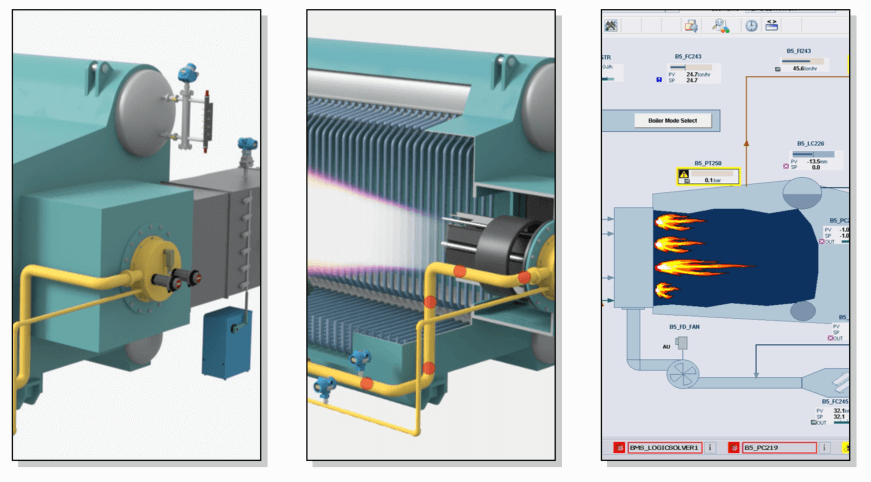Authors: Bob Sabin, Peter Kline
The Emerson Industrial Energy consulting team assisted a Northeastern U.S. specialty chemical manufacturer with modernizing the controls on two 1960’s vintage Combustion Engineering “D” Type process steam boilers. These units are critical to site operation as they supply steam to a common header that feeds processes throughout the production facility.
For each boiler, the existing controls consisted of hardwired relays for Burner Management System (BMS) functions and standalone single loop controllers for Combustion Control System (CCS) purposes.
Over years of operation, boiler field wiring had fallen into disarray and the hardwired BMS panels had always been very difficult to troubleshoot. The CCS loop controllers had provided good service for many years, but they were limited in functionality and had reached the end of their useful life. All these created challenges for plant personnel in maintaining reliable and optimal utility plant operation. This drove the development of a boiler controls improvement project.
The Industrial Energy consultants and project team helped the client start the modernization effort by engaging in a holistic approach to control modernization. This process began with a site survey that examined the condition of the boilers and reviewed the instrumentation and field devices that were in place. The team conducted a review of the overall boiler processes and their devices for compliance with the latest NFPA codes and recommended practices. In addition, the team interviewed plant personnel to understand their project objectives, issues that needed to be resolved, and ideas for achieving optimal utility area performance.
The initial Emerson survey effort resulted in a report that identified NFPA code deficiencies and field device issues that were then rectified by plant personnel. In addition, it documented a cut-over plan that was used to scope the installation effort for the new boiler BMS/CCS equipment.
 The new boiler controls were built using DeltaV SIS (Safety Instrumented System) hardware for safety functionality and DeltaV PAS (Process Automation System) equipment for combustion and process control. The DeltaV SIS hardware gave the plant the dedicated and separate safety functionality they needed while delivering the combustion controls integration that they desired. Plant operations and maintenance personnel had a single set of diagnostic tools and a single user interface window into both the BMS and CCS.
The new boiler controls were built using DeltaV SIS (Safety Instrumented System) hardware for safety functionality and DeltaV PAS (Process Automation System) equipment for combustion and process control. The DeltaV SIS hardware gave the plant the dedicated and separate safety functionality they needed while delivering the combustion controls integration that they desired. Plant operations and maintenance personnel had a single set of diagnostic tools and a single user interface window into both the BMS and CCS.
With the boiler control hardware, this approach provided the plant with its BMS and CCS control solutions tailored to the specific boiler units and site needs. Functionality included:
- DeltaV Standard BMS Solution incorporating burner starting and tripping logic, purge interlock monitoring, an intuitive graphical interface, and extensive system diagnostics supplying clear indication of causes for light-off difficulty and “first out” trip cause.
- DeltaV Standard CCS Solution for control of boiler process including drum level control, math based (stoichiometric calculations) fuel and air regulation with cross-limits, Oxygen trim control, historical trending, alarming, and boiler master pressure control.
The team completed the boiler process control improvement project by providing field training, start-up, and commissioning services at the site. Operations and maintenance personnel were trained on the user interface and diagnostic tools available to them, functional testing of the BMS was completed, and boiler load testing conducted. Finally, tuning of the boiler process regulatory control loops was accomplished.
This boiler control improvement project has brought tangible benefit to the plant. Emerson’s math-based combustion control has no legacy fuel to air curves with their inherent inefficiency. As a result, it has been possible to operate the boilers with improved response, better turndown, and lower excess oxygen levels. Thermal efficiency has improved 1-2 percent overall resulting in significant fuel savings.
In addition, the improved operability and troubleshooting diagnostics provided by the new controls has been well received by operations and maintenance personnel. Having English language descriptions of light-off permissives to be met and clear first-out trip information has minimized start-up delays and time-consuming troubleshooting efforts.
Coordination of the two boilers has also been improved. Operations has newfound flexibility to balance load and respond to steam system demand swings and upsets.
This boiler controls improvement project has given new life to two older but critical plant utility units such that they will remain a viable part of the site’s operation for years to come.
From Jim: Visit the Industrial Energy & Onsite Utilities section on Emerson.com for more on the technologies and solutions to drive improved operational performance.



